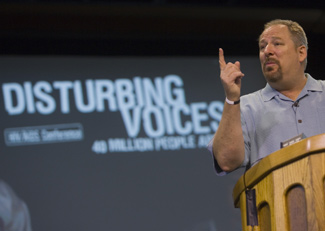| Home | Blog | Ask This | Showcase | Commentary | Comments | About Us | Contributors | Contact Us |

Can the GOP count on evangelicals in 2008?ASK THIS | February 12, 2007For the past two decades, the Republican Party has been able to count on loyalty from evangelical Protestants, including in the 2004 reelection of President Bush. But election results in 2006 suggest that Democrats may be making inroads among evangelicals. By Laura R. Olson Q. Did the Democrats make any significant gains among evangelical Protestant voters in 2006? Q. How might the Democrats locate potential supporters within the evangelical Protestant community? Q. What sorts of Democratic candidates and appeals might attract evangelical Protestant voters? Since the early 1980s, evangelical Protestants have constituted a highly loyal and cohesive electoral bloc for Republican candidates. Known for their conservative stances on socio-moral issues such as abortion and homosexuality, evangelicals are the backbone of the broader “religious right” political movement. In 2004, mobilizing evangelical Protestants, particularly in “battleground states,” was one of the chief strategies of the Bush-Cheney reelection campaign. But the success of the Democratic Party in the 2006 midterm elections suggests some loosening of the ties. The Pew Forum on Religion & Public Life estimates that white evangelical voters cast 3 percent more of their votes for Democratic congressional candidates last fall than they had in 2004; the Democrats’ gains were even greater—an estimated 7 percent increase—among white evangelicals who do not attend religious services every week. These gains are relatively small in absolute terms, but elections can turn on small shifts. There are other clues beyond the 2006 election results to suggest that the Democratic Party could hold some attraction for the most moderate evangelical voters. Specifically, some younger evangelical leaders have been expressing significant interest in issues eschewed by their predecessors. The National Association for Evangelicals, for example, recently has become actively involved in efforts to preserve the natural environment. The Rev. Rick Warren’s Saddleback Church in Orange County, California, has a substantial and ongoing HIV/AIDS initiative. Emphasis on such issues, especially if it comes at the expense of the standard elements of the religious right’s socio-moral agenda, might have the potential to lead some evangelicals to consider Democratic candidates under some circumstances. It would be a vast overstatement to say that the Republican Party no longer has an advantage over the Democrats when it comes to evangelical voters. The Pew Forum’s report shows that evangelicals were far less likely than any other American religious group to say they were “happy Democrats won” in 2006. The vast majority of evangelical churches, clergy, organizations, and rank-and-file members maintain their longstanding conservative stance on bread-and-butter religious right issues such as same-sex marriage. And despite some dissatisfaction with the current administration, no one should expect evangelicals to defect en masse to support the Democratic presidential nominee in November 2008. Nevertheless, the evangelical Protestant community is far more diverse than many observers think it is, and the fact that evangelicalism is growing and thriving in the United States means almost by definition that it will become more diverse in the years ahead. As John Green of the Pew Forum has observed, new “micro-targeting” campaign strategies will continually make it easier for political parties and candidates to reach (and, one would think, to mobilize) narrower and narrower constituencies (for example, moderate evangelicals who prioritize the environment ahead of abortion and homosexuality). Furthermore, moderate Democrats who emphasize their personal religious faith (such as Virginia Gov. Tim Kaine, Ohio Gov. Ted Strickland, and U.S. Senator Bob Casey of Pennsylvania) might be especially attractive to at least some evangelical voters.
|
|




